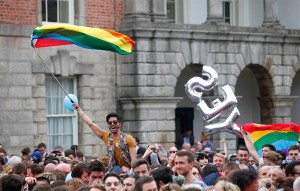Ireland Votes “Yes”!
May 26, 2015
Last Friday, May 22, the Republic of Ireland held a historic vote on same-sex marriage. By the time the votes were counted on Saturday, it was clear that the Irish had overwhelmingly voted in favor of recognizing same-sex marriages. The percentage of votes in favor was around 61 percent. Ireland was the first country to ever hold a national vote on the issue.

Supporters in favor of same-sex marriage celebrate at Dublin Castle on Saturday, May 23, after Ireland voted to legalize such marriages. (AP Photo/Peter Morrison)
The Parliament of Ireland could have passed a law recognizing same-sex marriage but instead chose to hold a referendum and give the citizens of Ireland a vote on the matter. Irish citizens could not vote on the referendum from outside of Ireland—that is, by absentee ballot. This led to thousands of expatriates (Irish living abroad) returning to Ireland to vote in person.
The “yes” vote reflects a shift in the culture of Ireland. In the early 1980′s, nearly everyone in the Republic of Ireland was Roman Catholic and 90 percent of Roman Catholics attended mass at least once per week. By 2011, around 80 percent of Irish citizens identified themselves as Roman Catholic, but fewer than 18 percent of them attended weekly services. Nearly all education in Ireland is controlled by the Roman Catholic Church, so most Irish citizens were educated in a Catholic school. The Church was strongly opposed to the legalization of same-sex marriage in Ireland. Yet, fewer than half population followed the teachings of the Church when voting on this issue.
The lessening in the authority of the Church in Ireland might spring from several factors. Certainly growing secularism in Western Europe may play a part. But, scandals involving the Catholic Church in Ireland have likely also played a role. Many of the scandals involved the abuse of children by priests and nuns.
Other World Book articles:


